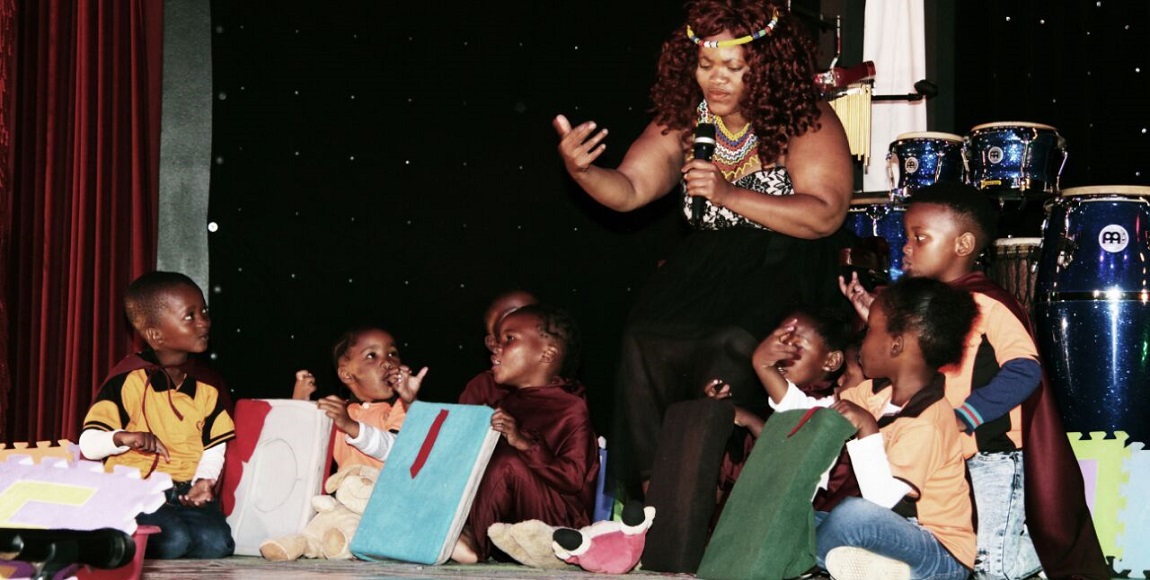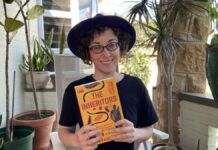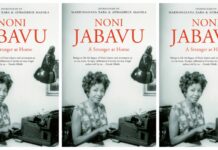Charmaine Mrwebi (34) used to visit the library daily as a child and fell in love with stories and storytelling – today her own book is on the shelves. The self-published author’s body of work spans 16 books, including two children’s books which have been published in five languages. Her latest work for children, Mogodutswane o Setouto, can be found in Bloemfontein bookstores and libraries in the Free State. She spoke to The Daily Vox about her literary journey, and using books and performance art to give back to her community.
Where did your love for literature come from?
Growing up in a poor family, I could not afford to buy my own books and the only thing to do was visit the library. I went almost daily after school. I could not afford to buy a Drum magazine. Even so at the library, the only rule was that I had to return the book clean and nice. It was exciting for me because as soon as I finished a book there were other books awaiting me.
You worked at a library for six years. What were your experiences working in a place you loved growing up?
Because I am a reader myself, it was great. It was a beautiful platform where I was surrounded by books and could read any books at any time. Beyond packing books, I had to come up with programmes where I did storytelling with local preschools. I was already an author at this point, so I had the opportunity to start a writers’ club for local authors. There were a lot of exchanges of literature and book launches. With community programmes, it became interesting [for people] to come to the library. People didn’t just come to the library and see books, they saw people they could identify with, specifically with their needs and challenges.
Do you feel the culture of reading which you had as a child has been lost in SA?
Yes, it has. Now, I am busy with a children’s production. A lot of parents don’t want to take their children to theatre, they just want to take their children to the mall. Rather than buying books, they get their children expensive phones.
What can be done to change this?
I think there is a responsibility for us as authors as well. We need to teach the community how to fall in love with reading. Even the content of our books should appeal to young children, adults and potential readers. It is a tough journey but it can be won.
You also perform your poetry for adults. Who do you prefer performing for?
I enjoy kids the most because they are honest. When I go into a reading, I come back very educated. Children are involved in my storytelling because I give them a platform to tell their own stories. These children teach me new songs, games or stories from their grandmothers.
Why did you choose to publish books in Setswana?
Growing up as a Setswana and visiting the library, I’d read about books that were limited and some I could not relate to them. One of the books I wrote is about how Setswana people raise their children from when they are taken to the hospital [to give birth]. It’s so important for Setswana children that when they access such a book, so that they know that as mothers and children, this is how we are raised.
What is your latest book Mogodutswane o Setouto (Lizzy the Naughty Lizard) about?
The book is about a lizard family in Modimolle Mountain in Polokwane. Their son is told to avoid humans because they would kill him, but he meets a good human one day. The moral of the story is that not every human hates animals.
How do children react when they see these books coming to life?
It is quite exciting for the children, they are able to participate because it is in their mother tongue.
Why did you choose to self-publish?
Unfortunately for me, there’s not a lot of big publishing companies in Bloemfontein that publish in Setswana, and some had conditions that did not make sense for me.
What were some of the challenges you faced?
It is very tough; if you don’t have a backbone, a foundation, and you don’t have a vision, it is going to die once the book is out. First of all, self-publishing is expensive. From editing to distribution, it is all money you take out of your own pocket. Because people don’t even know [about your work] you still have to work extra hard.
When did things start to change?
When I left my job as a librarian, I was sitting with my books and people were not buying them, but as I started visiting preschools, doing readings and dramatising my books, creches started paying an interest in my books. I give back to them by doing storytelling for free.
Did you have any mentors to help you through the your self-publishing journey?
Omoseye Bolaji, who is also an author, and my work at the library also helped because I had access to other self-publishers and different types of books.
What advice do you have for people who want to publish their own work?
You have to go beyond just writing and give it your whole heart, mind body and soul and not hope for a manager to come on board – the success of the book or the failure of the book is on you. You must believe in it to the extent that you invest your own money.
We need to create our own distribution channel. Sometimes we think we are big people as authors – we think once the book is out, we have arrived. But once the book is out, the journey starts. We have to find our own solutions.
Interview has been edited for brevity and clarity.









